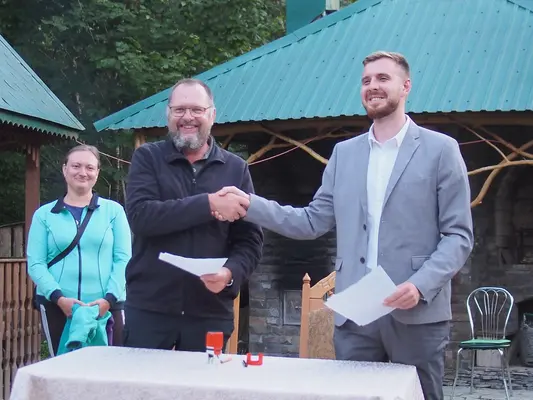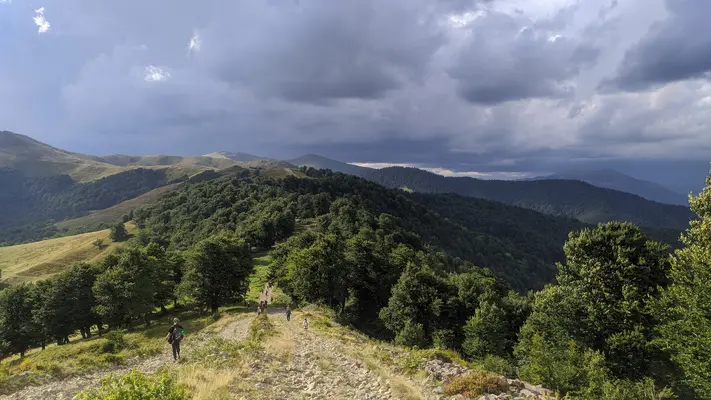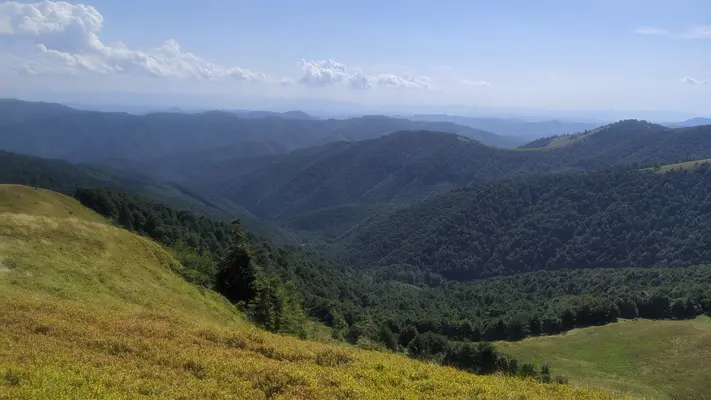Strengthening cooperation with the Ukrainian Carpathian Biosphere Reserve
On 13 August, the new director of the Ukrainian Carpathian Biosphere Reserve (CBR), Mykola Tarasyuk, ceremoniously signed the new cooperation agreement with the Eberswalde University for Sustainable Development (HNEE) as part of the annual student excursion of two HNEE degree programmes (International Forest Ecosystem Management B.Sc. and Global Change Management M.Sc.) to western Ukraine.

Director of the Carpathian Biosphere Reserve, Mykola Tarasyuk (right), and Prof Dr Pierre Ibisch (left) and Iryna Yonash (CBR employee) at the signing of the contract in Velyka Uholka, Ukraine.

Hike on the Krasna Poloninya in the CBR extension area

View of the UNESCO Shyrokiy Luh beech sub-area
Background to the co-operation
HNEE and the CBR have been partners since 2006 and have maintained a continuous cooperation ever since, especially in the context of the annual student excursions and the projects of Prof. Pierre Ibisch's working group at the Centre for Econics and Ecosystem Management. The first Memorandum of Understanding was signed back in 2008. Since then, they have been working together for over 10 years on the management and further development of the UNESCO World Natural Beech Heritage Site (formerly: The Primeval Beech Forests of the Carpathians, since 2017: Ancient and Primeval Beech Forests of the Carpathians and Other Regions of Europe).
The establishment of the Biosphere Reserves Institute (BRI) at HNEE in 2018, the desire arose to take the existing cooperation to a new level by means of a formal agreement. With the new cooperation agreement, the training of junior staff for biosphere reserves can also be made possible and supported internationally, e.g. in the course of research visits by students on the new Master's degree programme Biosphere Reserves Management (BIOM) as part of their research semester.
Focal points of the cooperation
The thematic focus of the cooperation in the coming years will be on further internationalisation, on the one hand in the context of managing the UNESCO World Heritage Site "Ancient and Primeval Beech Forests of the Carpathians and Other Regions of Europe" and the biosphere reserve itself. Climate change impacts focussing on beech forests will also be investigated and strategies and measures for ecosystem-based climate change adaptation will be developed and implemented. Furthermore, the aim is to strengthen cooperation with civil society and citizen participation in the management of biosphere reserves. Efforts to expand the area of the CBR and the development of transnational and cross-border cooperation with Romanian and Moldovan protected area partners will be monitored and supported.
Note on image material
The photos available here may be used for reporting purposes. Please note the copyright notices © HNEE / Jasper Carstens or © HNEE / Yuriy Lysak